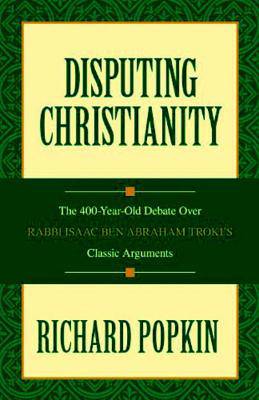
- Retrait gratuit dans votre magasin Club
- 7.000.000 titres dans notre catalogue
- Payer en toute sécurité
- Toujours un magasin près de chez vous
- Retrait gratuit dans votre magasin Club
- 7.000.000 titres dans notre catalogue
- Payer en toute sécurité
- Toujours un magasin près de chez vous
Disputing Christianity
The 400-Year-Old Debate Over Rabbi Isaac Ben Abraham Troki's Classic Arguments
Richard H Popkin
Livre relié | Anglais
62,95 €
+ 125 points
Description
Rabbi Isaac ben Abraham was a little-known scholar from the heretical Jewish group, the Karaites, who lived during the late 16th century in Troki, a suburb of Vilna (Vilnius), which by turns was in Poland or Lithuania. In 1593, the last year of his life, he wrote an incisive, cogent polemic against Christianity, which over the centuries has had an impact in Christian and Jewish circles that far exceeds what might have been predicted based on its obscure origins. A kind of underground, samizdat classic of religious criticism, Rabbi Isaac's critique of Christianity has been translated into Spanish, German, Latin, Yiddish, Ladino, and English, among other languages, and has influenced English deism, reform Judaism, the beginnings of Higher Criticism and the quest for the historical Jesus, and even Christian evangelical outreach programs that exist to this day. Now historian and philosopher Richard Popkin has edited a critique of Christianity, originally published in 1813 by a 19th-century Harvard graduate named George Bethune English, which includes the first publication in English of a central portion of Rabbi Isaac's text. The book was part of the discussion surrounding the founding of Unitarianism in New England. Popkin provides a fascinating commentary that notes many points of historical interest involving this unusual work. For example, Voltaire on a visit to England in 1724 learned of the work from an associate of the Reverend Anthony Collins, an English deist. The work was also used in debates about the merits of Christianity between Unitarian minister Joseph Priestly and Anglo-Jewish theologian David Levi. German scholars Hermann Samuel Reimarus and Ephraim Gotthold Lessing referred to the work in their early publications initiating the Higher Criticism movement examining the historical origins of Christianity. And the work also had an influence on Abraham Geiger, the founder of Reform Judaism; on David Deutsch, the defender of Orthodox Judaism; and on Evangelical Christian leader Hermann Strack of Berlin, whose use of excerpts from Rabbi Isaac's work can still be found in Evangelical Christian literature today. Anyone interested in philosophy of religion or the history of dialogue between Christians and Jews will find this work to be of great value.
Spécifications
Parties prenantes
- Auteur(s) :
- Editeur:
Contenu
- Nombre de pages :
- 246
- Langue:
- Anglais
Caractéristiques
- EAN:
- 9781591023845
- Date de parution :
- 01-08-07
- Format:
- Livre relié
- Format numérique:
- Genaaid
- Dimensions :
- 147 mm x 213 mm
- Poids :
- 417 g







